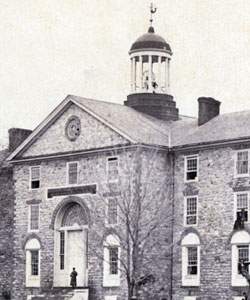Richard McAlister (Mealy, 2007)
Scholarship
Between 1850 to 1855, free-blacks living in Harrisburg had to overcome the corruption and deviance of Richard McAllister and his deputy marshals, Solomon Snyder and John Sanders, who continuously arrested, wrongfully, African Americans. The motive for these men to do such evil things was simply the prospect of making money and a personal ideology shaped from a childhood household of slaveholders. The Fugitive Slave Law granted financial incentives for every arrest and conviction of a fugitive slave. McAllister and his constables were awarded $1 for the recovery of a runaway. Even when they wrongfully arrested an alleged fugitive that was acquitted in court, they received a $5 reward.
Todd Mealy, Biography of an Antislavery City: Antislavery Advocates, Abolitionists, and Underground Railroad Activists in Harrisburg, PA (Baltimore: PublishAmerica, 2007), 145.
Richard McAlister (Dickinson Alumni Record)
Reference
*McAlister, Richard --- Born April 21, 1819, at Fort Hunter, Dauphin county, Pa.; A. B., 1840; U. P. society; 1842, admitted to Harrisburg bar; 1844, district attorney for Dauphin county; 1856, secretary to Governor Greary of Kansas; 1860, practiced law in Keokuk, Ia.; 1881, retired and moved to Washington, D. C., where he died about 1887.
George Leffingwell Reed, ed., Alumni Record: Dickinson College (Carlisle, PA: Dickinson College, 1905), 101.

